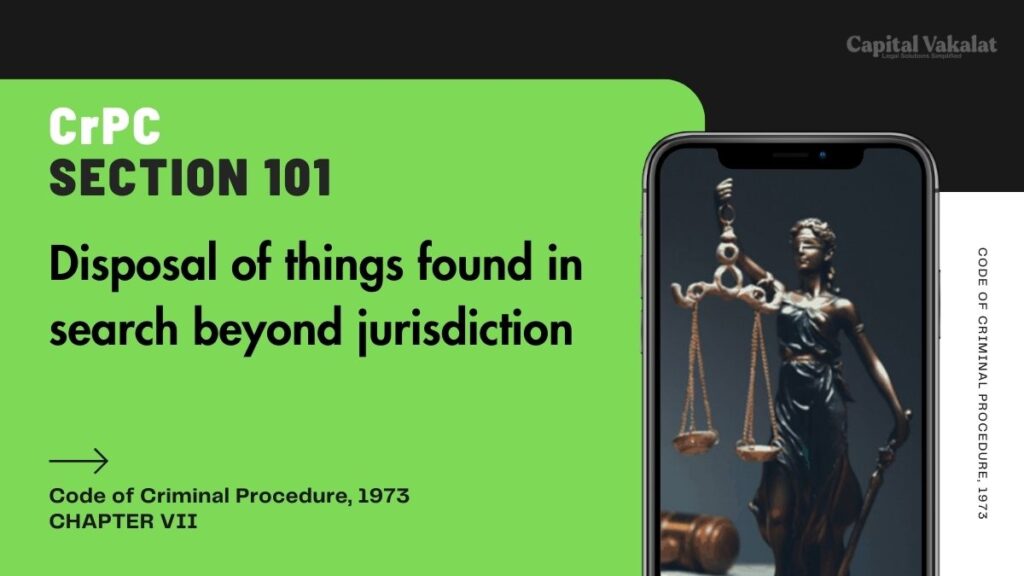The Code of Criminal Procedure (CrPC) in India outlines the legal procedures for criminal law enforcement. Among its various sections, Section 101 CrPC addresses a critical aspect of law enforcement: the disposal of items found during searches that occur beyond the jurisdiction. This article provides an in-depth examination of Section 101 CrPC, including its applications, legal implications, and practical considerations.

Section 101 of the Code of Criminal Procedure (CrPC) is an essential provision that guides the disposal of things found during searches conducted outside the jurisdiction of the searching authority. This section ensures that items found in such searches are handled legally and appropriately, maintaining the integrity of the law and ensuring justice is served. Understanding the nuances of Section 101 CrPC is crucial for law enforcement officers, legal practitioners, and individuals involved in legal processes.
Bare Act. Section 101 Cr.P.C.
Disposal of things found in search beyond jurisdiction.
When, in the execution of a search-warrant at any place beyond the local jurisdiction of the Court which issued the same, any of the things for which search is made, are found, such things, together with the list of the same prepared under the provisions hereinafter contained, shall be immediately taken before the Court issuing the warrant, unless such place is nearer to the Magistrate having jurisdiction therein than to such Court, in which case the list and things shall be immediately taken before such Magistrate; and, unless there be good cause to the contrary, such Magistrate shall make an order authorising them to be taken to such Court.
What is Section 101 CrPC?
Section 101 CrPC outlines the procedures to be followed when an officer conducts a search outside their designated jurisdiction and finds items that need to be disposed of. The section ensures that such items are managed in accordance with legal protocols to prevent misuse or mishandling. It provides a framework for the lawful custody and disposal of these items, ensuring transparency and accountability.
Legal Framework of Section 101 CrPC
The legal framework of Section 101 CrPC is designed to address the complexities that arise when searches extend beyond jurisdictional boundaries. The section stipulates that any items found during such searches must be reported to the Magistrate having jurisdiction over the area where the items were found. This ensures that the items are dealt with under the appropriate legal authority, maintaining the rule of law.
Applications of Section 101 CrPC
Section 101 CrPC applies to various scenarios where law enforcement officers conduct searches outside their jurisdiction. This could include situations where a crime spans multiple jurisdictions, or where evidence pertinent to an investigation is located beyond the local jurisdiction. The section ensures that all found items are legally processed, preserving the integrity of the investigation.
Practical Implications of Section 101 CrPC
The practical implications of Section 101 CrPC are significant for law enforcement agencies. Officers must be aware of the legal requirements when conducting searches outside their jurisdiction and ensure compliance with the provisions of Section 101. This involves proper documentation, reporting to the appropriate authorities, and adhering to legal protocols for the disposal of found items.
Disposal of Items Found Beyond Jurisdiction
The disposal of items found during searches beyond jurisdiction is a critical aspect of Section 101 CrPC. The section mandates that such items be presented to the Magistrate who has jurisdiction over the area where the items were found. The Magistrate then decides on the appropriate disposal method, which could involve returning the items to their rightful owner, retaining them as evidence, or destroying them if necessary.
Challenges in Implementing Section 101 CrPC
Implementing Section 101 CrPC can pose several challenges, including jurisdictional conflicts, coordination between different law enforcement agencies, and ensuring compliance with legal protocols. Addressing these challenges requires clear communication, robust legal frameworks, and training for law enforcement officers to navigate the complexities of cross-jurisdictional searches.
Case Studies Involving Section 101 CrPC
Case studies involving Section 101 CrPC provide valuable insights into its application and implications. These cases highlight the importance of adhering to legal procedures and the potential consequences of non-compliance. By examining real-world scenarios, law enforcement officers and legal practitioners can better understand the practical aspects of Section 101 CrPC.
Conclusion
Section 101 CrPC is a vital provision that ensures the legal and appropriate disposal of items found during searches conducted beyond jurisdiction. By adhering to the protocols outlined in this section, law enforcement agencies can maintain the integrity of their investigations, ensure justice is served, and uphold the rule of law. Understanding and implementing Section 101 CrPC is crucial for all stakeholders involved in the legal process, from law enforcement officers to legal practitioners and the judiciary.
Frequently Asked Questions
Who has the authority to dispose of items found during a search beyond jurisdiction?
The Magistrate with jurisdiction over the area where the items were found has the authority to decide on their disposal.
What challenges might arise in implementing Section 101 CrPC?
Challenges include jurisdictional conflicts, coordination between different law enforcement agencies, and ensuring compliance with legal protocols.
Can items found during a search be retained as evidence?
Yes, the Magistrate can decide to retain the items as evidence if they are pertinent to an ongoing investigation.
How does Section 101 CrPC ensure accountability in law enforcement?
By mandating proper documentation and reporting to the appropriate authorities, Section 101 CrPC ensures transparency and accountability in the disposal of items found during searches.
What happens if legal protocols under Section 101 CrPC are not followed?
Failure to follow legal protocols can lead to legal repercussions, undermining the integrity of the investigation and potentially leading to the dismissal of crucial evidence.